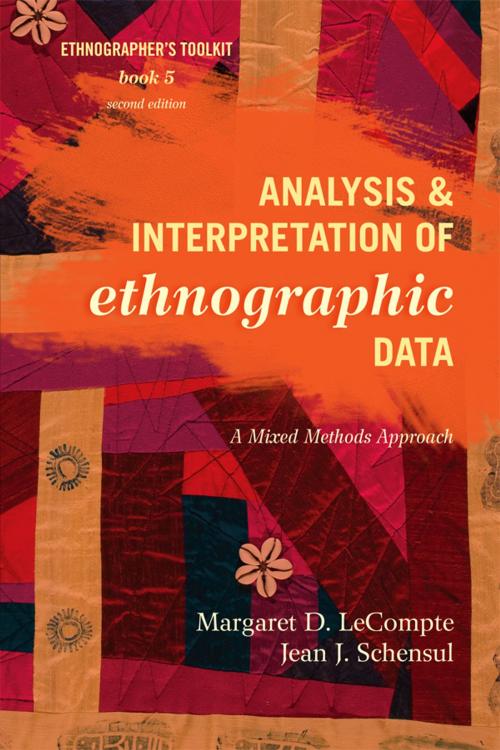Analysis and Interpretation of Ethnographic Data
A Mixed Methods Approach
Nonfiction, Social & Cultural Studies, Social Science, Cultural Studies, Ethnic Studies, Anthropology| Author: | Jean J. Schensul, Institute for Community Research, Margaret D. LeCompte, University of Colorado, Boulder | ISBN: | 9780759122086 |
| Publisher: | AltaMira Press | Publication: | August 31, 2012 |
| Imprint: | AltaMira Press | Language: | English |
| Author: | Jean J. Schensul, Institute for Community Research, Margaret D. LeCompte, University of Colorado, Boulder |
| ISBN: | 9780759122086 |
| Publisher: | AltaMira Press |
| Publication: | August 31, 2012 |
| Imprint: | AltaMira Press |
| Language: | English |
This is Book 5 of 7 in the Ethnographer's Toolkit, Second Edition.
Treating analysis as both a mechanical and a cognitive process, Book 5 begins by describing why analysis and interpretation of data are necessary. In the first two chapters the book points out the importance of beginning ethnographic analysis in the field, during the earliest stages of data collection, and how to move between induction and deduction, the concrete and the abstract, in a process informed by an emerging and increasingly refined conceptual model. The middle section tackles the challenge of transforming huge piles of text, audio, and visual information into
an ethnographic whole through generic and specific coding and quantification of qualitative data, using multiple extended examples. Chapters show how to use computers in analysis of qualitative data and ways to integrate the results of quantitative and qualitative data into a comprehensive picture of a complex whole. Chapter 9 presents a rare and comprehensive description of the statistics
regularly used by ethnographers to analyze ethnographic surveys. Chapters 10 and 11 show how researchers create and then fine-tune preliminary results into an integrated whole, display them for multiple audiences, and write them up. The final chapter illustrates how ethnographers can share the meaning of results with local communities and constituents and with other professional researchers.
Other books in the set:
Book 1:
Designing and Conducting Ethnographic Research: An Introduction, Second Edition
by Margaret D. LeCompte and Jean J. Schensul
9780759118690
Book 2:
Initiating Ethnographic Research: A Mixed Methods Approach
by Stephen L. Schensul, Jean J. Schensul, and Margaret D. LeCompte
9780759122017
Book 3:
Essential Ethnographic Methods: A Mixed Methods Approach, Second Edition
by Jean J. Schensul and Margaret D. LeCompte
9780759122031
Book 4:
Specialized Ethnographic Methods: A Mixed Methods Approach
edited by Jean J. Schensul and Margaret D. LeCompte
9780759122055
Book 6:
Ethics in Ethnography: A Mixed Methods Approach
by Margaret D. LeCompte and Jean J. Schensul
9780759122093
Book 7:
Ethnography in Action: A Mixed Methods Approach
by Jean J. Schensul and Margaret D. LeCompte
9780759122116
This is Book 5 of 7 in the Ethnographer's Toolkit, Second Edition.
Treating analysis as both a mechanical and a cognitive process, Book 5 begins by describing why analysis and interpretation of data are necessary. In the first two chapters the book points out the importance of beginning ethnographic analysis in the field, during the earliest stages of data collection, and how to move between induction and deduction, the concrete and the abstract, in a process informed by an emerging and increasingly refined conceptual model. The middle section tackles the challenge of transforming huge piles of text, audio, and visual information into
an ethnographic whole through generic and specific coding and quantification of qualitative data, using multiple extended examples. Chapters show how to use computers in analysis of qualitative data and ways to integrate the results of quantitative and qualitative data into a comprehensive picture of a complex whole. Chapter 9 presents a rare and comprehensive description of the statistics
regularly used by ethnographers to analyze ethnographic surveys. Chapters 10 and 11 show how researchers create and then fine-tune preliminary results into an integrated whole, display them for multiple audiences, and write them up. The final chapter illustrates how ethnographers can share the meaning of results with local communities and constituents and with other professional researchers.
Other books in the set:
Book 1:
Designing and Conducting Ethnographic Research: An Introduction, Second Edition
by Margaret D. LeCompte and Jean J. Schensul
9780759118690
Book 2:
Initiating Ethnographic Research: A Mixed Methods Approach
by Stephen L. Schensul, Jean J. Schensul, and Margaret D. LeCompte
9780759122017
Book 3:
Essential Ethnographic Methods: A Mixed Methods Approach, Second Edition
by Jean J. Schensul and Margaret D. LeCompte
9780759122031
Book 4:
Specialized Ethnographic Methods: A Mixed Methods Approach
edited by Jean J. Schensul and Margaret D. LeCompte
9780759122055
Book 6:
Ethics in Ethnography: A Mixed Methods Approach
by Margaret D. LeCompte and Jean J. Schensul
9780759122093
Book 7:
Ethnography in Action: A Mixed Methods Approach
by Jean J. Schensul and Margaret D. LeCompte
9780759122116















